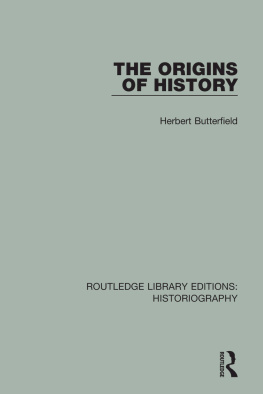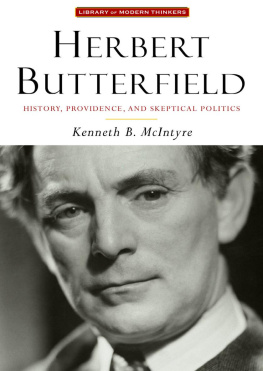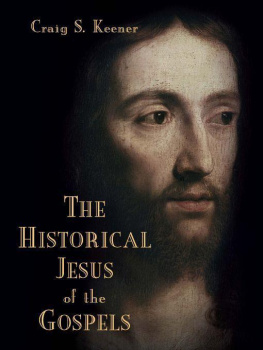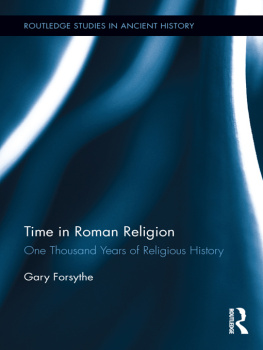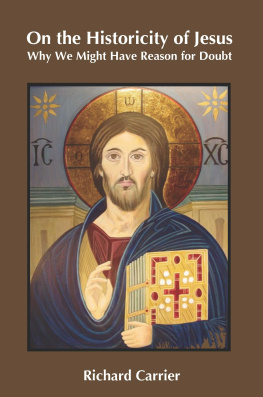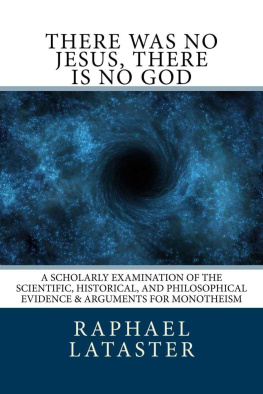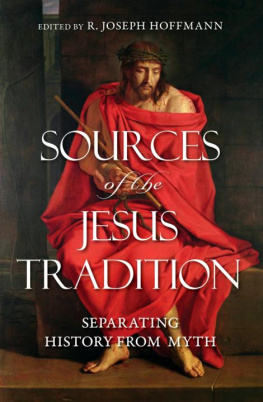First published in 1981 by Eyre Methuen
This edition first published in 2016
by Routledge
2 Park Square, Milton Park, Abingdon, Oxon OX14 4RN
and by Routledge
711 Third Avenue, New York, NY 10017
Routledge is an imprint of the Taylor & Francis Group, an informa business
1981 Herbert Butterfield Introduction 1981 J. H. Adam Watson
All rights reserved. No part of this book may be reprinted or reproduced or utilised in any form or by any electronic, mechanical, or other means, now known or hereafter invented, including photocopying and recording, or in any information storage or retrieval system, without permission in writing from the publishers.
Trademark notice : Product or corporate names may be trademarks or registered trademarks, and are used only for identification and explanation without intent to infringe.
British Library Cataloguing in Publication Data
A catalogue record for this book is available from the British Library
ISBN: 978-1-138-99958-9 (Set)
ISBN: 978-1-315-63745-7 (Set) (ebk)
ISBN: 978-1-138-18782-5 (Volume 9) (hbk)
ISBN: 978-1-315-64289-5 (Volume 9) (ebk)
Publishers Note
The publisher has gone to great lengths to ensure the quality of this reprint but points out that some imperfections in the original copies may be apparent.
Disclaimer
The publisher has made every effort to trace copyright holders and would welcome correspondence from those they have been unable to trace.
by Adam Watson
This book contains Sir Herbert Butterfield's distilled conclusions about how history came to be written, which he reached after research and meditation on this subject during the last quarter-century of his life.
Butterfield approached this vast and largely uncharted subject in a characteristic way, with no preconceptions, not knowing in what direction his researches would lead him. He was always particularly interested in the general conclusions that could be drawn from a detailed historical narrative, what he called the story itself. The Whig interpretation of history bothered him, as he explained in his book under that title, as well as the popular Marxist interpretation, and such personal simplifications and diagrams of the historical process as Spengler's and Toynbee's. The trouble was that in all of them the theory or interpretation or diagram came first. They were a priori intuitions. Sometimes, as he once said to me, it was a grandiose and imaginative one, but derived only very partially from the facts and owing more to other beliefs and other purposes in this world. Once you had such a theory, the selection of facts to fit it and demonstrate it became all too easy; the more so as selectivity is usually unconscious, and the aspects of the story that you underline and emphasise are the ones that seem to you genuinely important because they bear out your view of the world. Butterfield was concerned to start with the facts, the representative facts seen in their context; and where the facts were inadequate or seemed unrepresentative the answer was more detailed research. Then you needed to brood over the facts, and see what generalisations distilled themselves from them. He developed an extraordinary flair for this kind of open-minded deduction.
This approach to the understanding of history Butterfield liked to compare to the methods of Sherlock Holmes. After Lestrade had fitted many but not all of the facts into a plausible reconstruction of the events, Holmes would engage in minuter, more detailed microscopic research, and would then meditate over all the facts for long hours until a solution emerged from them which he recognised as right. This refusal to force the facts, to suspend judgement until they offered you their own answer, the ability not to prejudge anything, Butterfield called elasticity of mind.
This openness of mind about historical evidence was made possible for him by his belief in a Christ whose Kingdom is not of this world. In this way could be avoided the seductive 'worship of abstract nouns' which he considered much more dangerous than any worship of graven images. Christianity as he saw it did not merely permit you to be absolutely neutral about mundane events, so that you were no more committed about current affairs than (as he liked to say) about 'the blues and greens in the hippodrome in Constantinople': it positively required this detachment. To render unto Caesar the things that are Caesar's was an explicit command. The concluding sentences of Butterfield's Christianity and History express this concept with great feeling:
We can never meet the future with sufficient elasticity of mind, especially if we are locked in the contemporary systems of thought. We can do worse than remember a principle which both gives us a firm Rock and leaves us the maximum elasticity for our minds; the principle Hold to Christ, and for the rest be totally uncommitted.
In a note to me he once said, in his oblique and undogmatic way, that he was sometimes inclined to wonder whether any lesser degree of detachment from mundane causes (in the formative centuries of European civilisation) would have left the way clear for the development of the scientific and historical thinking that was a unique characteristic of the West. The same thought appears in several contexts in the present book.
If the history that really mattered to Butterfield was the generalisations that emerged from the facts, the most interesting questions of all concerned history itself. What was the relationship of men, at different times and in different civilisations, to their history, to their own past, to the past in general? Much of his earlier work points in this direction. The Whig Interpretation deals with the Whig and liberal Lestrades. The Englishman and his History traces what has changed and what is constant in our national attitudes to our past for the Irish, the Scots and the Welsh have very different relationships with their very different histories. Man on his Past deals with Western historiography from the eighteenth century to the present. But that was only the end of the story. The great question of how it all began remained unanswered, and by most people almost unasked.
The fundamental questions of the origins of historiography came to occupy a central place in Butterfield's thinking. How did men first begin to be aware of the past beyond living human memory, as something to take account of in their lives? By what stages, in which civilisations, did men's ideas about their past move towards history as a fully self-explanatory system of cause and effect? Why was this concept of the past, which excluded chance and divine intervention, something that has been finally achieved only in the West? And why, since it is so analagous to the western concept of 'science', did it not develop until some hundreds of years after the objective study of the natural sciences? The first questions were the hardest. The evidence available for the later stages of a panoramic view of historiography is abundant, and in places almost overwhelming; but in earlier periods, and especially the beginning, the clues have largely been lost, and it is difficult to detect what happened, difficult to recapture the spirit of such high and far off times.

